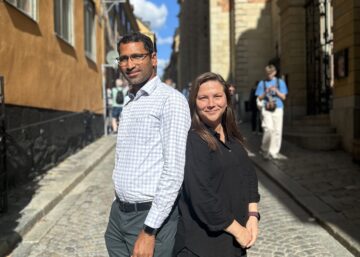We all have biases, whether acknowledged or not. Consider this: How many of your friends are of the opposite gender and between 20-30 years younger or older than you? Not many, right? This shows our inherent bias toward those similar to us. Even if we rarely think about our biases, they are influencing our actions, decisions, and choices. Organizations are no differnt, and their biases can accidentally pull them in the wrong direction, holding back rather than facilitating change. Overcoming organizational bias takes awareness, commitment to inclusivity, and dedication to embracing diverse perspectives. Time to think different!
Let’s start with my favorite one. The faster things move, the busier we get. Hello, tech – HELP!!! Wasn’t AI supposed to take our jobs? Feels like more work than ever right now. But doesn’t it also seem like many organizations favor running around and getting things done rather than taking the time to actually do the right thing? This is also referred to as the action bias; I like to call it “Busy is the new stupid bias.” Here is where the faster pace comes into play. If you have not automated your processes and your data isn’t in order, and you try to compensate for that with more manual work, well, you are going to be very busy doing the wrong things.
What is bias?
HIPPOs, according to Google, are the Highest Paid Person’s Opinion. The HIPPO bias means granting too much influence to someone in a position of authority, without critically evaluating their expertise. As things get more complex, letting the expert in is my advice. But also do not trust experts blindly because they can also be wrong. This is a bias in itself. Maybe it is time to think different. Let’s examine a list of biases I have often seen and experienced myself:
- Action Bias or Busy is the new Stupid Bias:
- Description: The preference to favor taking action, often driven by a belief that activity is more valuable than inactivity. This bias may come from a desire to appear busy or a mistaken belief that constant movement equates to efficiency.
- Overconfidence Bias:
- Description: Do you really know it all? Maybe one gender is heavier on this bias… Here I think the “old ideas I came up with that are still working” is a dangerous pitfall. You will not be successful in the future based on what happened in the past. The future will be different so old merits don´t count.
- Sunk Cost Bias:
- Description: Those things you built that you love and all the money you spend on that. It is human to hang on to the past and to both have emotional attachment to things you have done and also feel the pain of money already spent. But if you continue the waste will just increase. Let it go!
- Recency Bias:
- Description: Ever been in a meeting where a manager or an executive suddenly changes the whole conversation, and the meeting is suddenly about something else? And then later found out that they just came from a meeting on that specific topic. Our minds rule us, and the recent things discussed and mentioned will be top of mind, but are they the most important ones?
- Authority HIPPO Bias:
- Description: Again, the HIPPOS are the Highest Paid Person’s Opinion. I have never worked at Google, but I understand that they have clearly articulated this bias to make sure they do not fall for it. Maybe that is why they are so good at innovation? It simply means granting too much influence or credibility to someone in a position of authority, without critically evaluating their expertise.
- Expert Bias:
- Description: So, can the expert help then? Likely yes. But stay mindful and see some of the examples at the end of this article of how wrong experts have been wrong in the past. This bias if about the tendency to rely too heavily on the opinions of recognized experts or authorities, often without sufficiently considering alternative perspectives or independent analysis.
Can you relate to any of the above? I sure can. Painfully, I have probably been a HIPPO myself, and I love systems and things I have invested in in the past. Also, I struggle with action bias every day; getting things done feels so good. But if you cannot relate and you suspect an Overconfidence bias, here’s a self-assessment to get real including som hints:
- Action Bias:
- Question: Do we prioritize constant activity, and do we believe that being busy is always more valuable than taking strategic, intentional actions? Hint: If your day is packed with back-to-back meeting you are likely suffering from this.
- Overconfidence Bias:
- Question: Do we critically assess our own abilities and predictions, and are we open to feedback and alternative viewpoints? Hint: Do you get annoyed when you get questioned or do you ask for advise in an open-minded way. Try: “Who has a different perspective?” This will make it seem like you are looking for a treasure in other people’s minds.
- Sunk Cost Fallacy:
- Question: Do we make decisions based on the future potential rather than past investments, and are we willing to cut losses when necessary? Hint: You alreday started so you might just as well continue right…
- Recency Bias:
- Question: Are decisions influenced by recent events, or do we maintain a broader perspective by considering historical and long-term data? Hint: do you change the topic based on recent conversations or the latest news or do you zoom out to secure your are focusing on the right things
- Authority HIPPO Bias:
- Question: Do we critically evaluate the expertise and credibility of individuals in positions of authority, or do we unquestioningly accept their opinions? Hint: You change your backlog when you boss has a ”great idea”…
- Expert Bias:
- Question: When evaluating expert opinions, do we actively seek diverse perspectives and consider alternative viewpoints, or do we blindly trust established authorities? Hint: do you ask high price management consulting firms to tell you the truth without discussing with your team and considering alternative scenarios…
These questions can serve as a starting point for reflection, supporting in the redesign of decision-making processes for more future-proof value.
But before wrapping this up let’s get a little bit more into the expert bias. I think it is very interesting to list expert guesswork in retrospect to understand how incredibly hard the future is to predict.
Here are some examples:
- ”I think there is a world market for maybe five computers.” Thomas Watson, Chairman of IBM, in 1943
- ”The horse is here to stay, but the automobile is only a novelty—a fad.” – A prediction made by a president of a Michigan Savings Bank in 1903
- ”Remote shopping, while entirely feasible, will flop.” – A prediction by Time Magazine in 1966 regarding the unlikelihood of online shopping
- Bill Gates’s remark a few decades ago that 64 kilobytes of memory is enough for anyone.
- ”We don’t like their sound, and guitar music is on the way out.” – A Decca Records executive, rejecting The Beatles in 1962
All experts in their fields. So, what I am now saying, don’t trust the expert either. No no, I am just saying be balanced, broaden your perspective, and be aware of your biases.
In short, the action bias is one of the most crucial aspects of deriving value from transformations. Being mindful of the path ahead and making the best possible choices is essential. Also, learning to say ”No” when needed is a key part of the journey. Time to think different.



